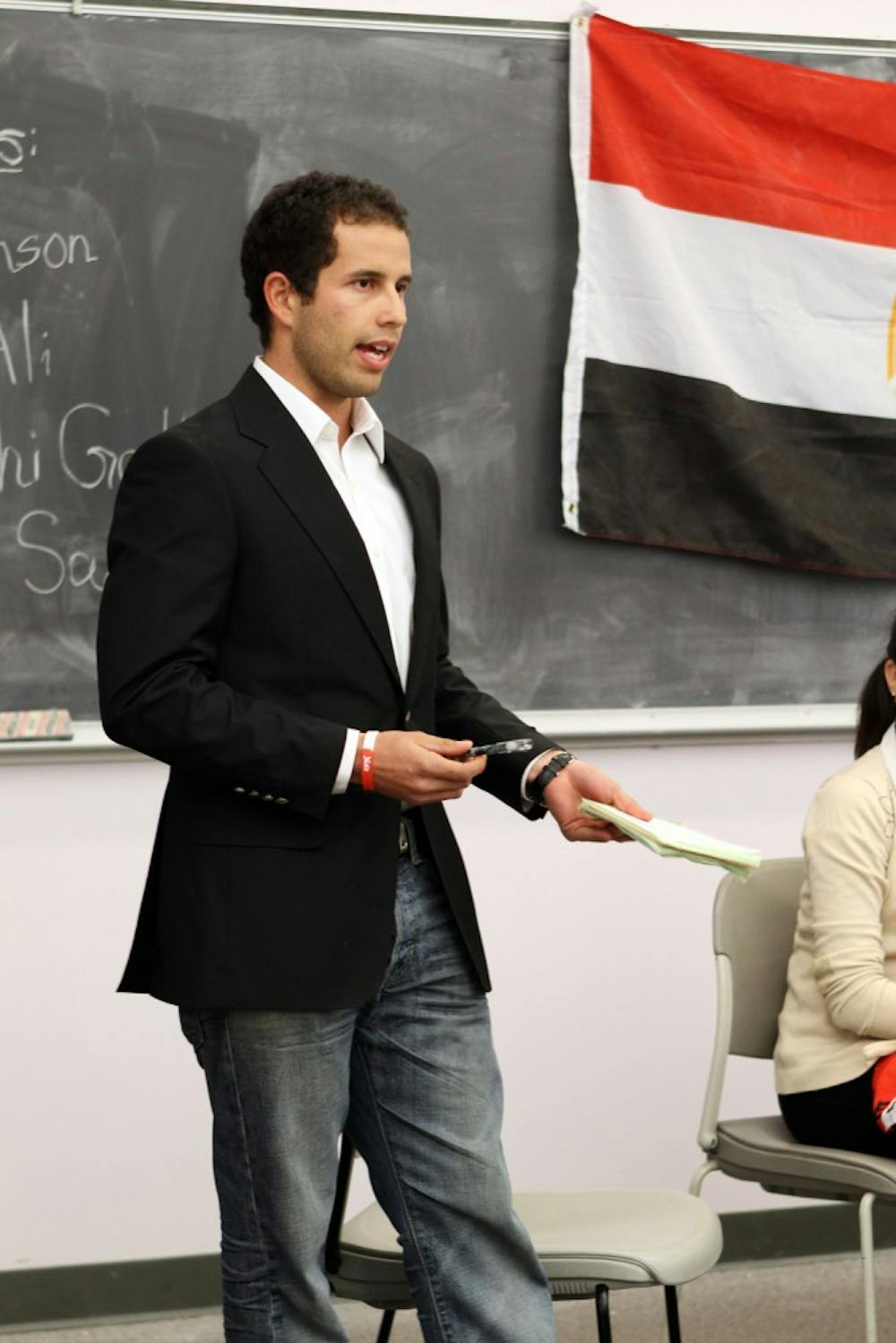It’s evening and smells of falafel and sounds of lively conversation drift through the basement of the Durham Language and Literature building on ASU's Tempe campus.
In mid-February, inside a lecture room there, the speaker’s table is decorated with flags from 15 Arab nations, linked together by a long, shiny string. But, at least for this moment, one flag gets special attention — a larger Egyptian flag that hangs prominently on the wall behind the handful of professors and students who lead the discussion at this year’s first Arab Students Association (ASA) meeting.
That morning, former Egyptian president Hosni Mubarak resigned after weeks of massive street protests to the popular will of the people. News of this change felt transcendent to some, crossing regional and cultural boundaries — even influencing the direction of ASA’s activities, according to club president Adam Morales.
“We want to expand on and continue that idea of a new beginning” that’s sprung from the successful uprising in Egypt, Morales says. “We want to use that as our inspiration this semester.”
The group plans to be more active in coming months by hosting events and reaching out to form partnerships with other Arab and student organizations.
The night’s discussion was centered squarely on Egypt: What the revolution there means for the Arab world, what problems might arise from it and what questions still remain to be solved.
The overall mood was extremely negative toward Mubarak, extremely positive toward the protest movement and extremely hopeful toward the future.
After one speaker said that all the Egyptian protesters should be congratulated for the day’s success, one person from about 40 in attendance shot his hand in the air:
“I have a small objection [to] what you just said … I think all of the Muslims, all of the Christians in Egypt should be congratulated for today, and all the Arabs should be congratulated, because for everyone, this is a day of victory.”
Later, in an interview, ASU freshman Mohamed Al Moosawi elaborated on his idea.
Moosawi, a chemical engineering student, said while living for 10 years in Oman and eight years in the United Arab Emirates, he made many Egyptian friends and is saddened by how the Mubarak regime oppressed the nation’s long, rich culture and talented people.
So in Moosawi’s mind, the Egyptian revolution is cause for not just all Egyptians, nor even just all Arabs, but for all people to celebrate. “As a human being, you won’t accept [for] any other human being to be oppressed," he says. "Simple. It’s just that.”
Egypt was already going to be the first meeting’s discussion topic, ASA president Morales says, but Mubarak’s resignation that morning shifted the focus from the protests themselves to what comes next, and what the effects are going to be.
“The timing of this really couldn’t have been better,” he says.
Morales and ASA are not the only ones at ASU who have seized this moment. On Feb. 10, a new faculty group called Islamic Studies Research Alliance staged its first event to raise awareness about Islam.
The group (its acronym is ISRA, which comes from an Islamic tradition) held a teach-in on the Tempe campus to promote greater understanding of the upheaval in Tunisia and Egypt. ISRA launched its plans a little earlier than expected because of these revolutions, says founding member and religious studies lecturer Chad Haines.
“Events sort of propelled us into the limelight,” he says.
The teach-in was about sharing experiences among the nearly 30 people in attendance, Haines says. It was a place to air questions, voice concerns and address fears about what’s currently going on in the Middle East.
Egypt’s popular revolution — and the huge amount of attention Americans have paid to it — may force people to deal with some harmful assumptions and prejudices, like the conflation of “Arab” and “Muslim,” Haines says.
“The tendency is to see anything that’s going on in the Middle East as Islam,” he says. “Yet here we have a moment… that has nothing to do with Islam. This comes from the Egyptian people, and no one else,” says Haines, and “Americans will have to realize that.”
Islam is sometimes “demonized” by many Americans, he adds — mostly due to lack of cultural knowledge. And both Muslim and Arab-Americans must dispel these myths and simultaneously reclaim their identities.
“How do you define yourself as sort of a global, modern Muslim?” Haines asks. The question of definition goes for Arab-Americans, too: “What is the identity that comes out of that?”
Perhaps ASA and other student organizations will answer that call. Morales says his group’s mission is simply to build on old relationships and create new ones.
This seems to be happening already, according to Morales: ASA membership is at more than 300 students this semester, a definite increase from when he joined the group two years ago. And while the majority of members are ethnically Arab, he says at least 30 percent of the club is not.
He recognizes that prejudice and misinformation about Muslim and Arab-Americans still exists, but says his organization wants to move past all that. In 2011, the year of Tunisian, Egyptian and now Libyan revolutions, ASA won’t acknowledge anything but partnerships and progress.
“Reaching out to the community should not be that difficult,” Morales says, between bites of hummus and warm pita, “and more just, like, logical and reasonable.”
Reach the reporter at trabens@asu.edu.





